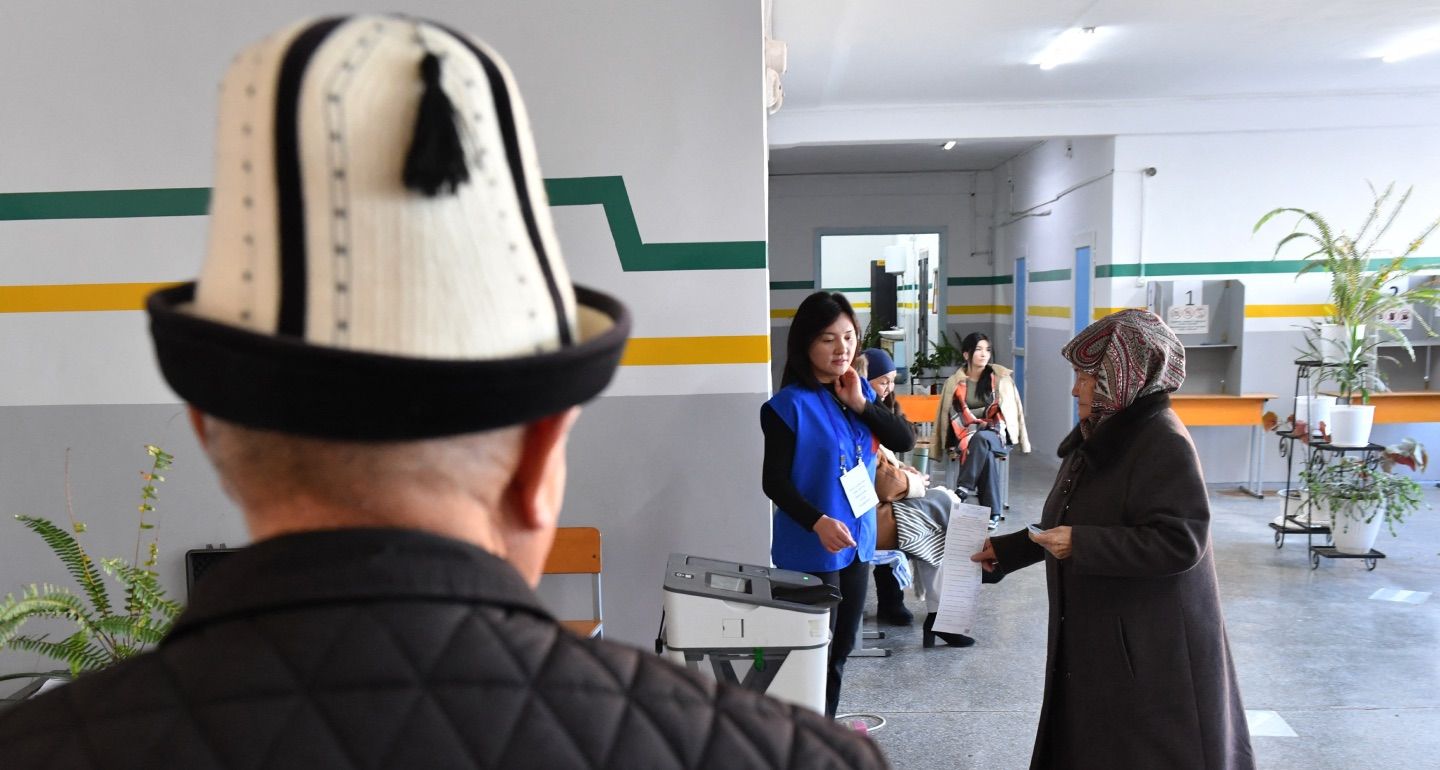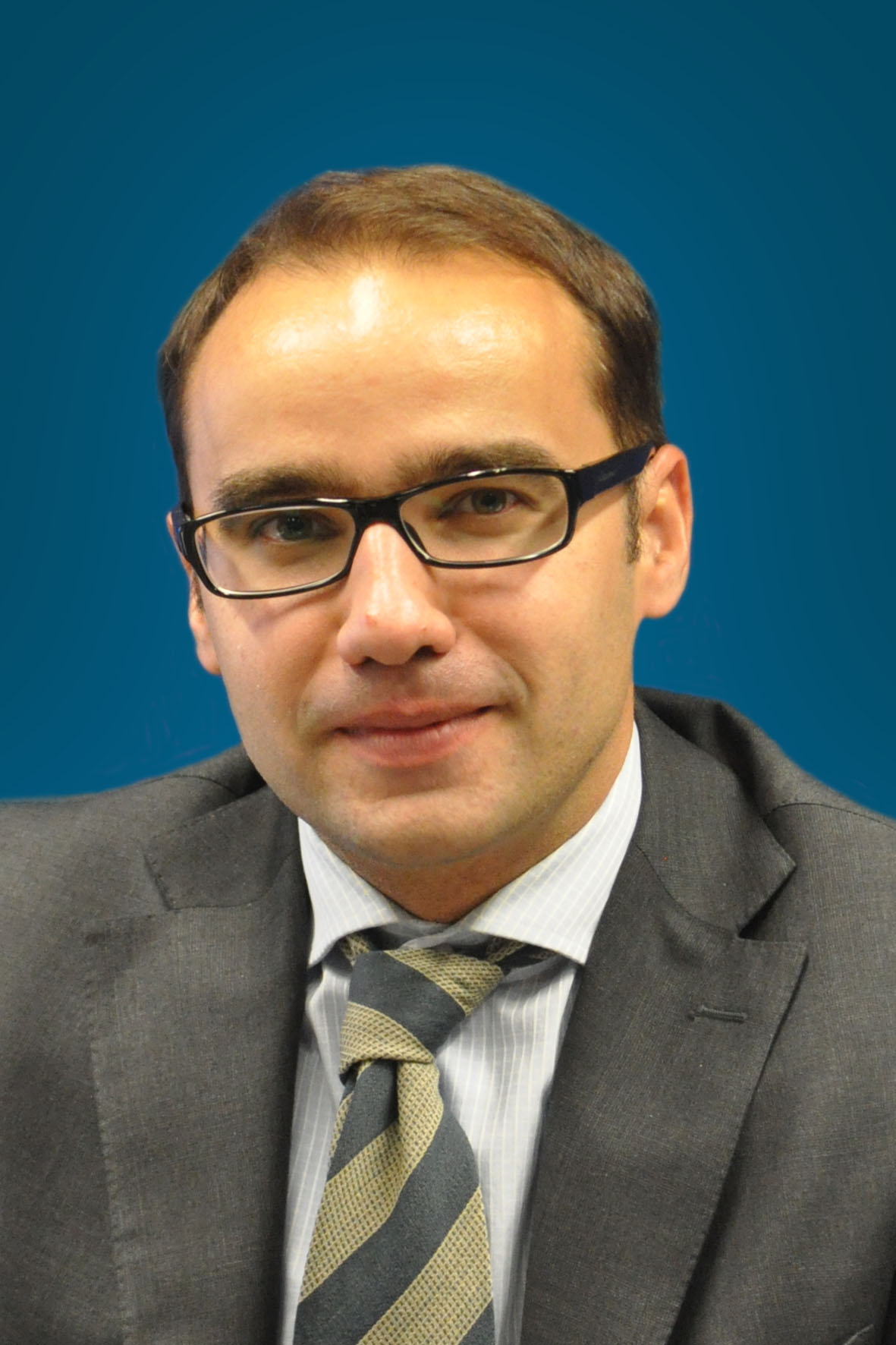The use of technology to mobilize Russians to vote—a system tied to the relative material well-being of the electorate, its high dependence on the state, and a far-reaching system of digital control—is breaking down.
Andrey Pertsev
{
"authors": [
"Galiya Ibragimova"
],
"type": "commentary",
"blog": "Carnegie Politika",
"centerAffiliationAll": "",
"centers": [
"Carnegie Endowment for International Peace",
"Carnegie Russia Eurasia Center"
],
"collections": [
"Aso Tavitian Initiative"
],
"englishNewsletterAll": "",
"nonEnglishNewsletterAll": "",
"primaryCenter": "Carnegie Russia Eurasia Center",
"programAffiliation": "",
"programs": [],
"projects": [],
"regions": [
"Kyrgyz Republic",
"Central Asia"
],
"topics": [
"Domestic Politics",
"Political Reform",
"Civil Society"
]
}
Source: Getty
The abolition of party-list voting doesn’t mean Kyrgyzstan’s parliamentary elections will be free of intrigue and competition. It’s just that they will likely unfold behind closed doors.
Kyrgyzstan’s political system is once again on the brink of transformation. Officially, nothing too extraordinary is happening: the parliament voluntarily dissolved itself early, scheduling elections for November 30. The ostensible reason is to stagger the parliamentary and presidential campaigns, which would otherwise have been held back-to-back in late 2026 or early 2027.
The real goal of the snap elections, however, appears to be to give President Sadyr Japarov the opportunity to subjugate parliament once and for all before running for a second term, and to clear the political field of opponents: not just the remnants of the opposition, but also his partner and unspoken rival in the ruling tandem, Kamchybek Tashiev, head of the State Committee for National Security, to whom Japarov owes much of his rise to power.
Unlike the other authoritarian countries of Central Asia, Kyrgyzstan was long considered a relatively well-established democracy. At the very least, power changed hands on a regular basis (albeit through street protests), independent media outlets were able to operate, and human rights NGOs went about their work without too much pressure from the authorities.
However, after the 2020 protests that brought Japarov to power, the country began rapidly moving toward the autocracy typical of the region. In 2021, the new president rewrote the constitution, ending the short-lived parliamentary-presidential form of government and restoring a presidential system.
Then followed systemic restrictions on freedom of speech: independent media outlets were shut down, and editorial offices like Kloop and Temirov Live, which specialized in anti-corruption investigations, came under intense pressure from the authorities, including through the arrest of journalists and the designation of media outlets as “extremist.”
In 2023, Kyrgyzstan launched a registry of “foreign representatives” analogous to Russia’s notorious “foreign agents” law. All NGOs receiving foreign funding are required to register. Officially, this was done to combat corruption, but in reality, it was intended to monitor the activities of human rights organizations.
Japarov also initiated judicial reform that increased the courts’ dependence on the executive branch: by controlling the rotation of judges, the president gained the ability to appoint people loyal to him. Moreover, if court decisions are deemed to contravene the “morality and ethics of Kyrgyz society,” they can simply be ignored.
A few months before the last parliament voluntarily dissolved itself in September, Japarov implemented yet another electoral legislation reform. The country was divided into thirty constituencies, each of which is to elect three deputies. Party lists were abolished, and candidates can now only put themselves forward in three-member constituencies.
In practice, this should help the president strengthen his control over parliament. It’s much easier to keep tabs on candidates via districts rather than national party lists, which insufficiently loyal people have previously been known to infiltrate. The new system effectively eliminates the possibility of random or opposition figures entering parliament.
To be on the safe side, disloyal parties were in any case purged before the elections. Last fall, the leaders of the Social Democratic Party associated with former president Almazbek Atambayev—arguably the last remaining opposition force—were arrested on charges of vote-buying. Then, just days before the election, Atambayev’s son Kadyrbek—another of the party’s leaders—was arrested on suspicion of attempting a coup.
This, however, doesn’t mean the parliamentary elections will be devoid of intrigue and competition; just that they will primarily unfold behind closed doors and reflect the growing unease between the country’s two most powerful men: President Sadyr Japarov and top security official Kamchybek Tashiev.
The partnership between Japarov and Tashiev began back in the late 2000s when they began their political careers in nationalist movements and served in the government under then president Kurmanbek Bakiyev. In the 2010s, they took part in opposition movements together.
During the mass protests against election fraud in the 2020 parliamentary elections, their partnership reached a new level. Tashiev, as leader of the opposition Mekenchil party, went to the penal colony where Japarov had been imprisoned on charges relating to 2013 protests over the Kumtor gold mine, and secured his release.
Japarov’s image as a political martyr made him a more suitable figure for the unifying role of president, while the less public Tashiev headed the security forces, making him a figure comparable in influence to the president.
Tashiev, unofficially dubbed the “people’s general,” publicly supports Japarov and his bid for a second term. At the same time, he is rapidly expanding his own authority, which is now starting to exceed that of the president at times. In Kyrgyz politics, which is so personalized, this has inevitably sparked rumors that the country’s top security official may have presidential ambitions of his own, and even speculation that the upcoming parliamentary elections could be a rehearsal for a power struggle between Japarov and Tashiev.
The two continue to publicly display friendship and mutual respect, but their growing rivalry is becoming increasingly evident. Tashiev denies having any presidential ambitions, yet often behaves as if he’s already on the campaign trail: he travels to the regions, intervenes in the work of local authorities, and resolves local issues.
Since all important decisions are made by the president and the security forces anyway, at first glance, the fight for parliamentary seats in Kyrgyzstan looks inconsequential. Deputies in the last convocation emphasized their loyalty to the tandem, and those who dared to disagree quickly fell from grace. Still, parliament remains an important part of the system of government: it approves key laws and the budget, appoints ministers, and declares states of emergency. It’s hardly surprising, therefore, that Japarov is keen to strengthen his position in this institution ahead of his bid for re-election.
It was the president himself who initiated the early dissolution of parliament. It appears that one of the reasons for doing so could have been that the majority of deputies from the outgoing convocation owed their mandates not so much to Japarov as to Tashiev. The 2021 parliamentary elections took place almost immediately after the change of power, when Japarov, recently released from prison, was still getting to grips with his role as president. Tashiev, however, played a leading role and essentially controlled the process.
Now Japarov is using electoral reform to try to correct past shortcomings and bring more of his own people into parliament. The transition to three-member constituency elections reduces the role of the party apparatus, where Tashiev’s influence has traditionally been strong. Still, any candidate loyal to the president must still pass through filtration by the State Committee for National Security, meaning Tashiev retains ample leverage to weed out anyone he doesn’t like.
Moreover, a significant number of former deputies from the self-dissolved convocation are running for the new parliament, and they all know that any independent assessment of the government’s actions risks being met with major pressure and even intimidation from the country’s top security official. Tashiev has given parliamentarians a harsh dressing down on more than one occasion, and accused some of concealing criminal records or corruption.
Since the abolition of party lists, the campaign has fragmented into numerous small constituencies, with nearly five hundred candidates running mostly without coherent platforms or clear political affiliations. In this situation, it’s difficult to understand where the candidates’ loyalties lie and what they will do if they win.
For all the shortcomings of Kyrgyzstan’s party system, in which parties lacked clear ideologies and were often created to suit the needs of a specific leader, they provided at least some structure to the country’s political life. Now the abolition of party lists risks turning the new parliament into a disparate collection of individual politicians who have no clear idea of how to coordinate their actions—or around whom they should be orienting their efforts.
All this is happening as the president prepares to run for reelection. If that bid ends in mass protests and a change of regime sparked on the streets, as has happened before in Kyrgyzstan, resolving that crisis could prove far more difficult, as it would compound the fragmented, non-partisan parliament and the de facto dual power at the top of the Kyrgyz state apparatus.

Galiya Ibragimova
Expert on Central Asia and Eastern Europe
Carnegie does not take institutional positions on public policy issues; the views represented herein are those of the author(s) and do not necessarily reflect the views of Carnegie, its staff, or its trustees.
The use of technology to mobilize Russians to vote—a system tied to the relative material well-being of the electorate, its high dependence on the state, and a far-reaching system of digital control—is breaking down.

Andrey Pertsev
As discussions about settlement and elections move from speculation to preparation, Kyiv will have to manage not only the battlefield, but also the terms of political transition. The thaw will not resolve underlying tensions; it will only expose them more clearly.

Balázs Jarábik
With the blocking of Starlink terminals and restriction of access to Telegram, Russian troops in Ukraine have suffered a double technological blow. But neither service is irreplaceable.

Maria Kolomychenko
Despite its reputation as an island of democracy in Central Asia, Kyrgyzstan appears to be on the brink of becoming a personalist autocracy.

Temur Umarov
The Russian army is not currently struggling to recruit new contract soldiers, though the number of people willing to go to war for money is dwindling.

Dmitry Kuznets